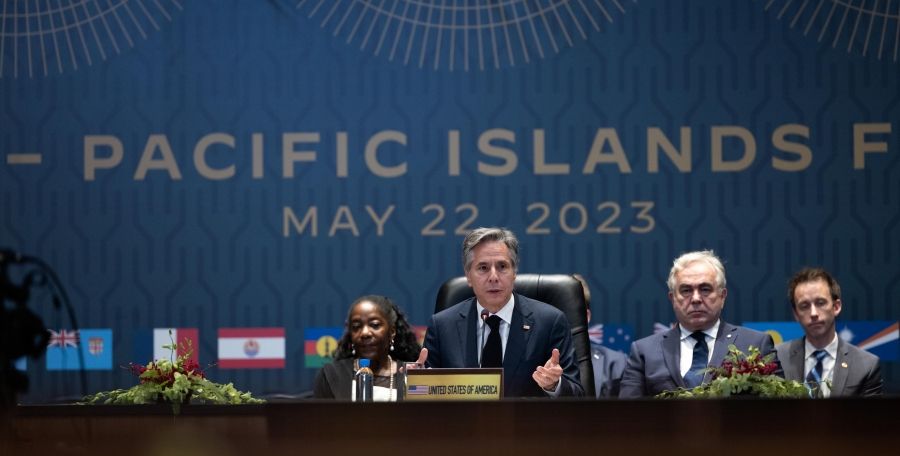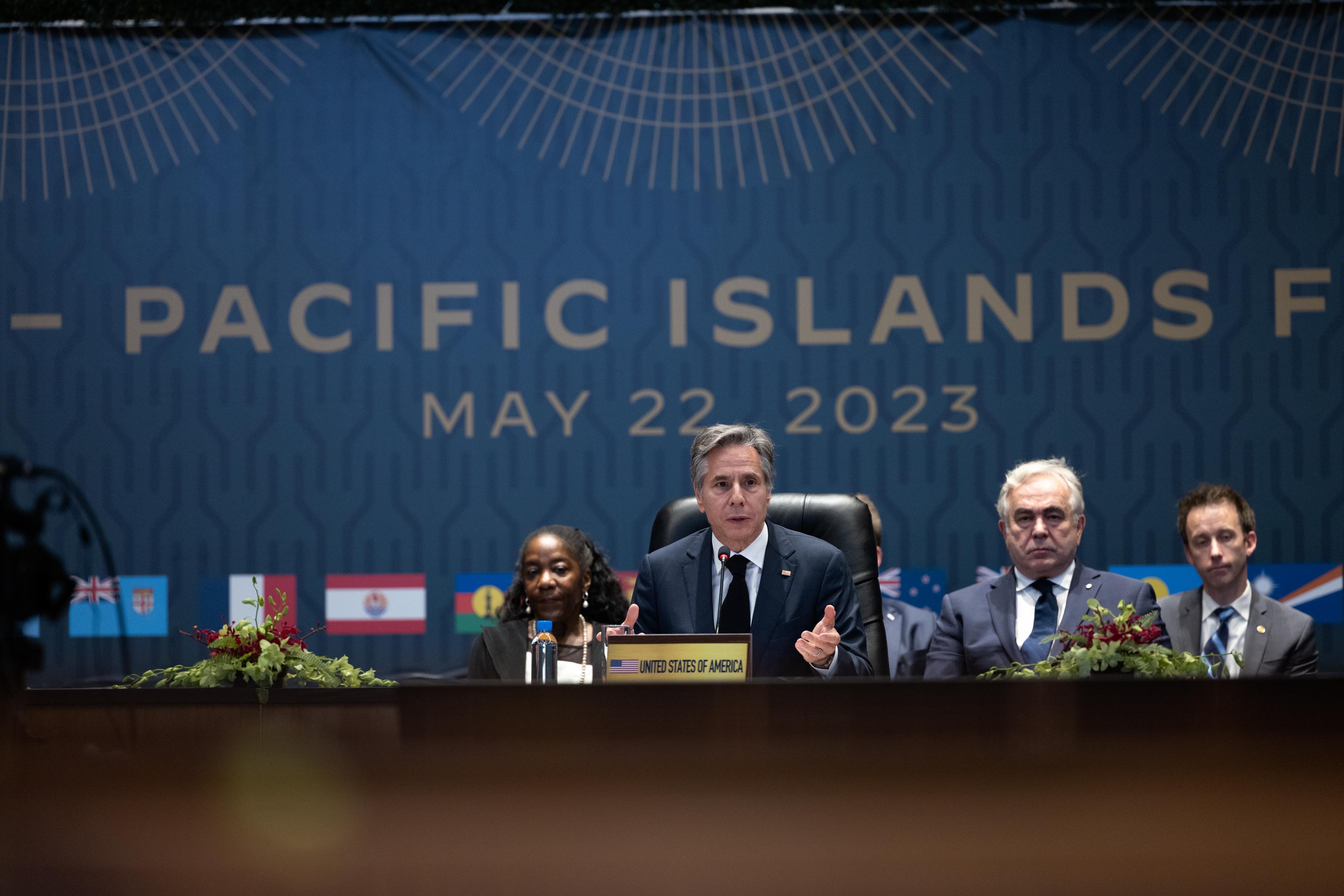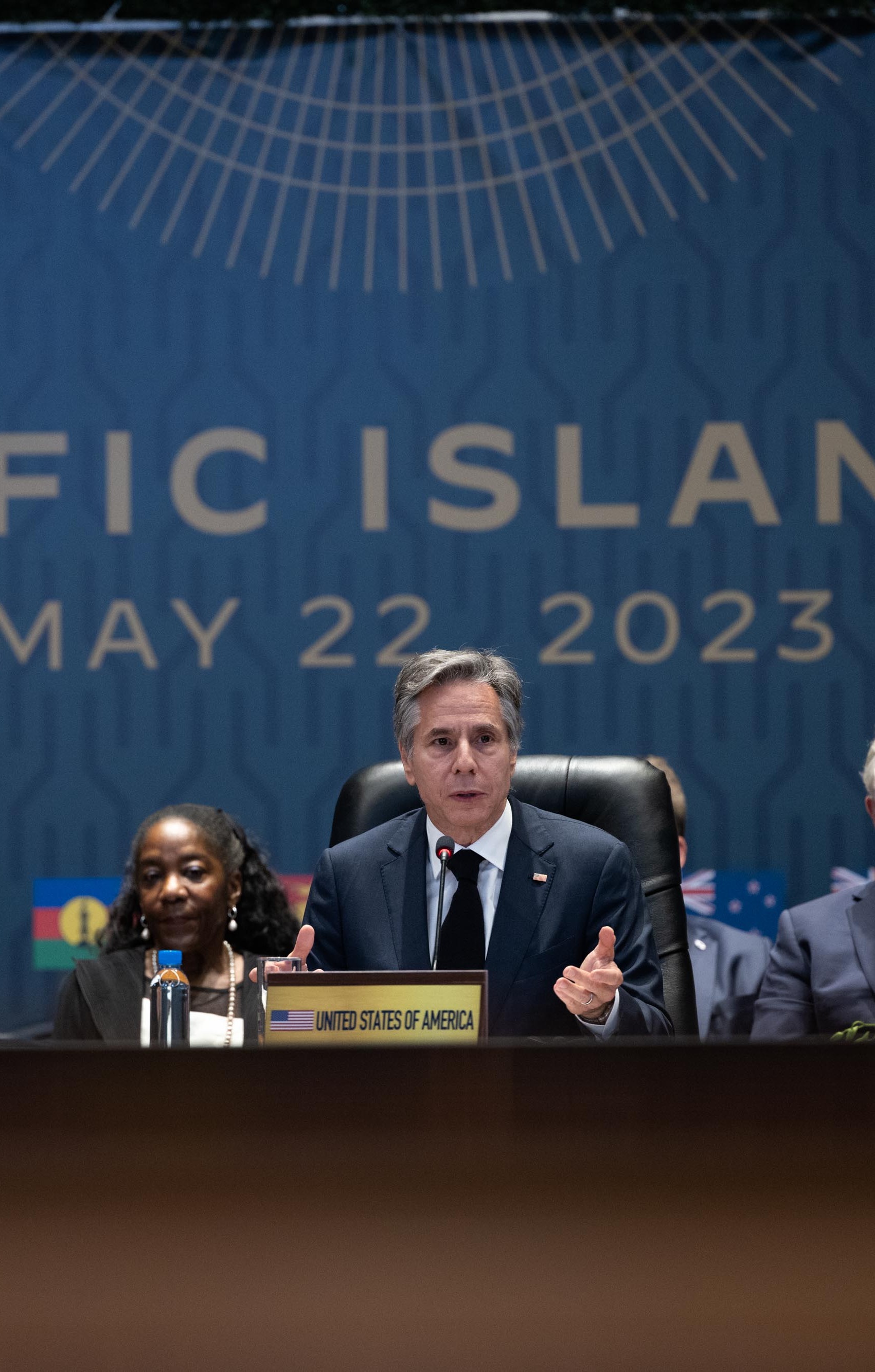
- Free Article: No
- Contents Category: Commentary
- Custom Article Title: Statehood à la carte
- Review Article: Yes
- Article Title: Statehood à la carte
- Article Subtitle: Sovereignty games in the Pacific Islands
- Online Only: No
- Custom Highlight Text:
In 22 May 2023, US Secretary of State Antony Blinken and Papua New Guinea (PNG) Defence Minister Win Bakri Daki signed a defence and maritime cooperation agreement in Port Moresby. Blinken stepped in after US President Joe Biden’s last-minute cancellation. Had he attended, it would reportedly have been the first time a US president had visited a Pacific Island country other than US territories such as Hawaii and Guam. This is on the back of having pledged an additional US$800 million at a US-Pacific Summit in late 2022 to help tackle climate change, overfishing, and maritime security.
- Featured Image (400px * 250px):

- Alt Tag (Featured Image): Jack Corbett on sovereignty games in the Pacific Islands
The problem with these explanations of Australia’s failure to secure its defence and foreign policy objectives in the region is that they are all supply-driven. They assume that we are the key actor and that our decisions, policies, and expenditure determine outcomes. This is hubris. Most obviously it overlooks Australia’s long-standing alignment with US foreign policy interests. More importantly, the supply-driven view neglects to even consider the fact that Pacific Island countries also have agendas and strategies that they are pursuing independent of Australia’s wishes. This is a serious oversight.
The Pacific region has long been viewed by policy makers located in Australia as an arena of great power competition in which islands and islanders are objects, not subjects. With the exception of islands like Guam, which was first visited by Europeans in 1521 and became a waystation for Spanish galleons en route to colonies in the Philippines, the Pacific region was among the last to be colonised. Some islands were annexed for their resources during the twentieth century, especially phosphate on Nauru, Banaba (Kiribati), and Angaur (Palau), while sugar plantations were established in Fiji in the mid-nineteenth century and copra cultivation was established elsewhere (the industry had declined by the 1950s). But much of the region was occupied for strategic rather than economic reasons, with the leaders of Australian colonies urging Britain to deny German annexation. The view that the islands of the Pacific form a strategic perimeter in the defence of Australia remains common to this day.
The idea that Pacific Islands were small blank spots on a map that might serve strategic purposes was reinforced during World War II, when Kwajalein (Marshall Islands), Tarawa (Kiribati), Truk (now Chuuk, Federated States of Micronesia), Guadalcanal (Solomon Islands), and Peleliu (Palau), to name but a few, became famous battle sites. The people who lived on these islands, before and since, are typically absent from the popular narrative of this conflict. When they are represented, as in Terence Malick’s 1998 film A Thin Red Line, they are depicted in an idealised ‘pre-modern’ state of nature, as a counterpoint to the senseless brutality brought by supposedly advanced Westerners to their shores.
The assumption that these islands were objects persisted throughout the Cold War, a period in which several islands, including Bikini and Eniwetok (Marshall Islands), Kiritimati (Kiribati), and Mururoa (Tahiti) were used by the United States, the United Kingdom, and France, to test nuclear weapons. The battle to compensate the victims of these atrocities is ongoing. The fact that these tests occurred at all was a consequence of the prevailing object view of the Pacific, with former US National Security Adviser Henry Kissinger widely quoted as sanctioning nuclear testing in the Marshall Islands (‘There are only 90,000 people out there. Who gives a damn?’).
Decolonisation should have shifted this perspective, but it didn’t. British, Australian, and New Zealand colonial officials, who had largely neglected their island territories in the Pacific because they didn’t return a profit, remained sceptical that these communities could ever achieve economic self-sufficiency and thus they delayed decolonisation. When they eventually decided to support it, they did so in a rush, with little preparation. In the South Pacific, Australian and New Zealand development assistance was designed to fill the void. But aid dependence only reinforced the view that island communities were objects whose allegiance had effectively been bought. This view became explicit in the aftermath of the Solomon Islands ‘switch’ in 2022, with commentators aghast at the perceived insolence of a country that apparently owed Australia for billions of dollars spent on the Regional Assistance Mission to Solomon Islands (RAMSI) between 2003 and 2017.
The US never completely relinquished its influence over the islands in the North Pacific over which it fought during World War II. The Trust Territory of the Pacific Islands (1947 to 1994) was unique in that it was explicitly strategic, which effectively meant that the United Nations couldn’t monitor what the US did there. The countries that made up this Trust Territory were among the last in the region to decolonise. They did so via a negotiated ‘compact of free association’ with the US, a key condition of which was the exclusive right to use select islands for military purposes. The second compact of free association is due to expire in 2023 and a third is being negotiated. But even if an agreement cannot be reached, US influence is guaranteed via majority membership of the Trust Fund Committee created as part of the second compact in 2003.
The prevailing view of the Pacific as an arena, and its islands as objects in a larger game of great power competition, has always been overdrawn. Some local leaders sought to manipulate colonisation to suit their ends, as in Fiji, where Ratu Cakobau offered to cede the islands to Britain in 1872, or Tonga, where George Tupou II negotiated protectorate status with Britain in 1900 and in doing so maintained control over domestic affairs. And when they were unable to exert influence, some protested, as in Samoa during the Mau movement of the 1920s. Some Pacific Islanders were combatants in World Wars I and II, and many more formed the labour force of crucial supply chains. Kiribati controversially allowed Russian fishing fleets access to their territorial waters at the height of the Cold War, while FSM opened diplomatic relations with China in 1989. Indeed, decisions by island leaders to recognise China or Taiwan have been well publicised. Now the US and its allies are being ensnared in a similar game of shifting allegiances.
I have called the policies that island leaders have pursued since independence ‘statehood à la carte’ because they involve a broader menu of development strategies than mainstream theories predict. Development economists, when they consider the Pacific at all, assume they must follow larger states and seek to move up value chains, from agriculture to manufacturing and eventually services, even though the global tourism boom enabled many islands to jump straight to the latter. The fact that Small Island Developing States (SIDS) haven’t followed the conventional path is considered a function of their small size and the diseconomies of scale it produces. The common antidote is regional integration and labour mobility, a view enshrined in the Pacific Agreement on Closer Economic Relations (PACER) and PACER Plus trade agreements.
But sovereignty sales is another avenue open to island leaders, and as the game of switching diplomatic allegiances shows, they have proven adept at exploiting these opportunities when they arise. The object view of islands in the Pacific assumes that sovereignty has absolute characteristics – territory, population, a flag, anthem, currency, etc. – all of which serve to convey status in an international hierarchy populated by great powers, middle powers, and smaller states. By contrast, SIDS in the Pacific, but also other regions such as the Caribbean and Indian Ocean, have treated it as a commodity that can be leased and traded.
The à la carte strategies of Caribbean states have typically revolved around financial services, including the operation of tax havens and citizenship-by-investment schemes. Their success hinges on the fact that even though the fees for these services appear minuscule to larger countries and corporations, they represent considerable revenue for small populations. When combined with tourism, Caribbean SIDS have effectively exploited a niche created because their statehood is guaranteed by an international order that upholds sovereign equality and non-interference regardless of population size. In doing so, they have secured a level of economic development that is the envy of many other postcolonial countries.
Pacific states were latecomers to financial services and have had less success with this sector as a result. But they have had other successes. The sale of fishing rights is a long-standing practice that has become more lucrative over the last decade, when Parties to the Nauru Agreement committed to stronger management measures in their vast exclusive economic zones (EEZs). Switching diplomatic recognition and the trading of votes in multilateral institutions for development assistance are other common activities. Philately, numismatics, and the sale of internet domain names (Tuvalu was designated ‘.tv’) are examples of small-scale sovereignty sales that have nevertheless proved important revenue streams for some Pacific states. As we have seen, island communities in the North Pacific have long traded in strategic denial by negotiating ‘compacts’ that permit the exclusive use of their territory by the US military, with the base on Kwajalein the most high-profile example. Now the escalating geopolitical contest between the US and China offers the South Pacific an opportunity to engage in a version of the same game. Indeed, Australia has effectively been leasing sovereignty in the South Pacific for decades via its ‘Pacific Solution’ of establishing asylum seeker detention facilities on Nauru and Manus Island.
The practice of statehood à la carte is not a grand strategy in the sense that it stems from a supremacist ideology or aspiration for conquest. It is a pragmatic, anti-foundational response to the contradictions inherent in a postcolonial order in which political independence is perceived to mean little unless it is accompanied by economic development. As the profitability of industries such as agriculture declined, and tourism proved vulnerable to global market fluctuations (and now climate change), island leaders have responded by creating and exploiting niches and forms of enclave capitalism. The danger, as leaders in the North Pacific have long been aware, is that their greatest source of potential income in this new era of geopolitical competition also carries an inherent risk that, as with World War II, they could become embroiled in a conflict in which they have little direct stake in the outcome.
How should Australia respond to this new game, in which island leaders hold the crucial cards? The starting point is to recognise that the perceived failure is not as obvious, nor the explanations as straightforward, as many commentators would like to believe. Australia has been caught out because the rules of the game are changing. Indeed, they have been shifting for some time, as was recently articulated in the 2018 Boe Declaration and the Blue Pacific narrative, but for much longer if we recognise the successful diplomacy of SIDS in global climate negotiations, even if it has taken a while for Australian policy makers and politicians to take this change seriously. The hubris of the view of islands as objects should now be abundantly clear. It should also bring with it new-found humility. This humility, and the respect it implies, should in future be the bedrock of Australia’s responsive or demand-driven engagement with the region.
The recent ALP language of ‘partnership’ and ‘family’ attempts to make this move. But despite the enthusiasm of the new government, it will remain empty and hypocritical rhetoric if Australian policy makers continue to assume that their deeper pockets will deliver them an upper hand. They won’t, partly because Australia is now playing a game of one-upmanship with two great powers that can easily outbid it, but also because the premise is flawed. In a game of one-upmanship, positions are only as strong as the next funding commitment, not those of the past. This is the advantage of practising statehood à la carte amid geopolitical competition that Pacific Island leaders have grasped.
The disadvantage of relying on à la carte strategies is that they depend on constant innovation, because large states regularly attempt to close niches and loopholes to protect their interests. The OECD has spent decades cracking down on tax havens via its blacklisting regime, for example. A global minimum tax rate would further erode the profitability of the financial services for SIDS. Citizenship-by-investment schemes are also under increased surveillance. Philately and numismatics are not as popular as they once were, and so on. As each niche is closed, another must be found if basic services are to be maintained.
The ability to sign security agreements with larger states is a new niche for South Pacific states. Others will likely be climate related, including blue and green bonds, as well as ocean carbon sinks and biodiversity preservation. If Australia wants to be a valued ‘family member’, it could champion these types of climate financing mechanisms and help build the capacity of Pacific states and regional organisations, in which they hold privileged positions as members, to leverage them. Indeed, it is already facilitating sovereignty sales via the Pacific Maritime Security Program, which effectively involves Pacific countries outsourcing to larger countries responsibility to patrol EEZs. These zones are home to the biggest sustainable tuna fishery on earth.
To be in the business of responding to what Pacific leaders need, Australia must dispense forever with the idea that these island communities are objects to manipulate for geopolitical purposes. They have always been subjects, seeking to manoeuvre the tides of history in ways that suit their desires and improve their condition. By recognising this, and embracing the humility and respect this implies, Australia can better position itself as an authentic partner and valued broker. Attempting to have it both ways – offering genuine partnership while insisting that islands and islanders are objects over which it can have undivided influence – is unlikely to produce the outcomes policy makers desire.
This article is one of a series supported by Peter McMullin AM via the Good Business Foundation.



Comments powered by CComment